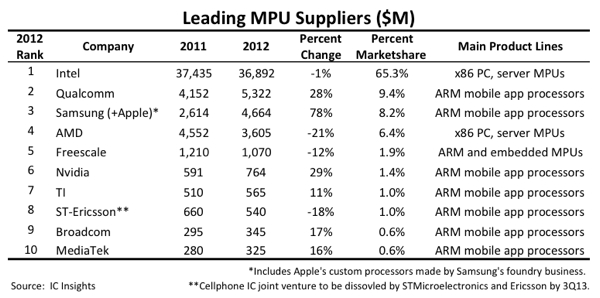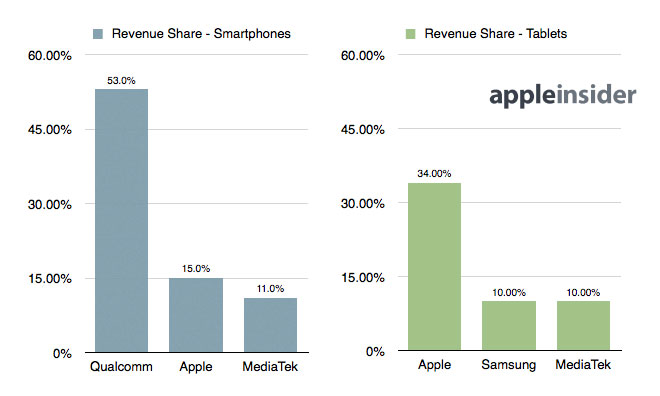There is quite a lot of action happening in the processor market thanks to the growing Smartphone sales. Especially since the inception of Android, mobile application processor providers like Qualcomm (NASDAQ: QCOM), Samsung (KRX: 005930) and MediaTek (TWSE: 2454) have broken in to the list of top 10 MPU vendors. We are about to see a new trend in the mobile phone SoC (System On A Chip) market this year. Every SoC vendor wants to introduce a 64-bit processor in their line-up. This shake-up happened after Apple (NASDAQ:AAPL) released the first ever 64-bit mobile application processor which powers the iPhone 5S. As per Apple’s claims, the A7 is twice as powerful as the previous generation A6 SoC. Apple was quick to claim that its Apple A7 was the first SoC to embrace the ’64-bit desktop class architecture’. This somehow led to a misconception that its performance gains have been because of a move from a 32-bit to a 64-bit architecture.
To clear this misconception, we need to know how most of the mobile processors are designed. ARM Holdings (NASDAQ: ARMH), a British firm designs CPU architectures for mobile devices. They either sell these processors or license the architecture to SoC vendors. Brands such as Qualcomm, Samsung, Apple, Nvidia (NASDAQ: NVDA), MediaTek, etc use ARM’s technologies to design their SoC (System On Chips). Nvidia, Samsung and MediaTek use the ARM CPU cores directly. Apple and Qualcomm buy licences from ARM and they design their own CPU cores which are compatible with ARM’s ISA (Instruction Set Architecture). Qualcomm was the first mobile SoC provider which started designing custom CPU cores which were compatible with ARM’s ISA. Starting with A6 which featured Swift CPU cores, even Apple joined the league.
Apple A7 Performance Gain Depends Upon Various Factors
A move to the 64-bit architecture was seen as a way to use more than 3 GB of RAM in future, but there is more to it than meets the eye. The CPU cores used inside Apple A7 are codenamed as Cyclone. It is an improved version of the Swift CPU core used in the Apple A6. According to AnandTech, these Cyclone cores are in the same league as the ARM A57 CPU cores. This increase in performance is not restricted to a move from 32-bit to 64-bit architecture. There are a lot of factors which play their role in this performance gain. Apple A7 features out-of-order execution which improves performance by quite a margin. L1 cache has been doubled from 32KB to 64KB each, for instruction and data. It also features better L2 cache latency, memory latency, branch prediction and memory pre-fetchers. Apple’s A7 also has support for faster LP-DDR3 RAM.
Another reason for increase in performance is the increase in the total transistor count. Apple A7 is built on a 28nm HKMG process while the previous generation Apple A6 was manufactured using a 32nm fabrication process. This results in ~20% more transistors in the same die area. On the GPU side of things, A7 incorporates a new Rogue graphics processor (G6430) from Imagination Technologies (LSE: IMG). It has 4 GPU clusters and a pixel crunching rate of 115.2 GFLOPS. This results in faster gaming performance, transition effects and multimedia.
Need Of Operating System Optimization For 64-Bit Hardware
Similar to how Nvidia forced everyone to move towards higher number of cores than better ones, the market drive for 64-bit processors is likely to continue for a while. But that doesn’t promise huge performance gains compared to what we’ve experienced in terms of Apple A7. To take proper advantage of these 64-bit processors, the operating systems need to be optimized with newer hardware. Apple has already optimized the iOS 7 and all the first-party applications to take full advantage of 64-bit processing.
Apple does a great job of pushing all the famous apps and game developers to make use of new hardware just to showcase how major the performance gains are due to their newer hardware. Google (NASDAQ: GOOG) and Microsoft (NASDAQ: MSFT) need to work much harder and faster to make their platforms not only 64-bit compatible but also to make sure that it is fully optimized. There has been a recent news that Intel (NASDAQ:INTC) has completed the development of 64-bit Android kernel, making their BayTrail and Merrifield SoCs compatible with Android v4.4 KitKat.
How Samsung & Other Brands Are Planning To Tackle This Challenge From Apple
Samsung had already announced that their next generation flagship devices, Galaxy S5 and Galaxy Note 4 will be equipped with 64-bit processors. Continuing with the hype, Samsung might equip the Galaxy S5 with 4GB of RAM, just to showcase how capable their upcoming Exynos processor is. Samsung has been known for its huge marketing prowess. Samsung spent more on marketing than on R&D in the year 2013. Samsung’s profits have declined compared to last year and Samsung needs the latest processor to win the game this year. With huge marketing capital, Samsung will make sure that they make people realize the presence of 64-bit processors in Galaxy S5.
Nvidia has already unveiled the Tegra K1 in CES 2014. It comes with a variant which has a custom dual-core 64-bit Denver CPU. Denver is Nvidia’s first attempt in using custom CPU cores for better performance. Industry experts are very excited about Tegra K1, thanks to its ultra-powerful GPU and the custom CPU architecture. Also, similar to Intel and Apple, they are using just a dual-core CPU instead of quad-core. According to industry experts Anand Lal Shimpi and Brian Klug, less number of faster cores are better than higher number of slower CPU cores in day-to-day tasks. Also, Nvidia Tegra K1 marks a huge jump in terms of GPU performance, thanks to the inclusion of the Kepler architecture. Tegra K1’s Kepler GPU is twice as powerful as some of the competitors, including Apple’s A7.
Qualcomm owns more than 30% market share as of 2013 and is considered as the leader in mobile SoC market. Generally, it stands toe-to-toe with Apple SoCs in terms of introducing newer technologies as well as real world performance. But it is now on the back foot. They are yet to announce a 64-bit compatible processor in their line-up. This means that we can’t see any 64-bit Qualcomm SoC powered devices till the end of 2014. Intel’s upcoming BayTrail SoCs features 64-bit CPU cores and is the only architecture that can not only match but defeat Apple’s A7 in terms of CPU only performance.
Starting with BayTrail, Intel will stop using GPU solutions from Imagination Technologies and start including Intel’s home baked GPU solution in the form of Intel HD 4000 (cut down variant with 4 EUs instead of 16 EUs). It looks like Nvidia’s Tegra K1 and Intel’s BayTrail will rule the roost if Qualcomm doesn’t act soon. Huawei are coming up with their own 64-bit SoC later this year. With new entrants like LG (KRX: 003550) entering the mobile SoC market, it looks like there will be a lot of competition starting 2014.





Question: Are you a tech columnist or a financial columnist?
It seems from the body of the article you are just quoting stuff that has been trotted out elsewhere…
The only reason for the headline is that tired old meme that the only advantage you get from 64 bit is access to more memory.
Most of the gains from the “over-hyped” A7 comes from the new Instruction Set that is much cleaner and far faster than the crufty old 32 bit version.
The only reason for the use of the word “over-hyped” is that the competition doesn’t have an answer yet. A bit like the old Microsoft trick of, whenever anyone launched something new, the Microsoft sales people would say, “oh don’t worry about that, we’ve been working on that and will release something very similar but with our support in the coming months…”
Whoever it may be that produces the new 64 bit chip sets for the other companies still have to have a 64 bit version of Android to run. At the moment the only Android version that runs 64 bit is the Intel version.